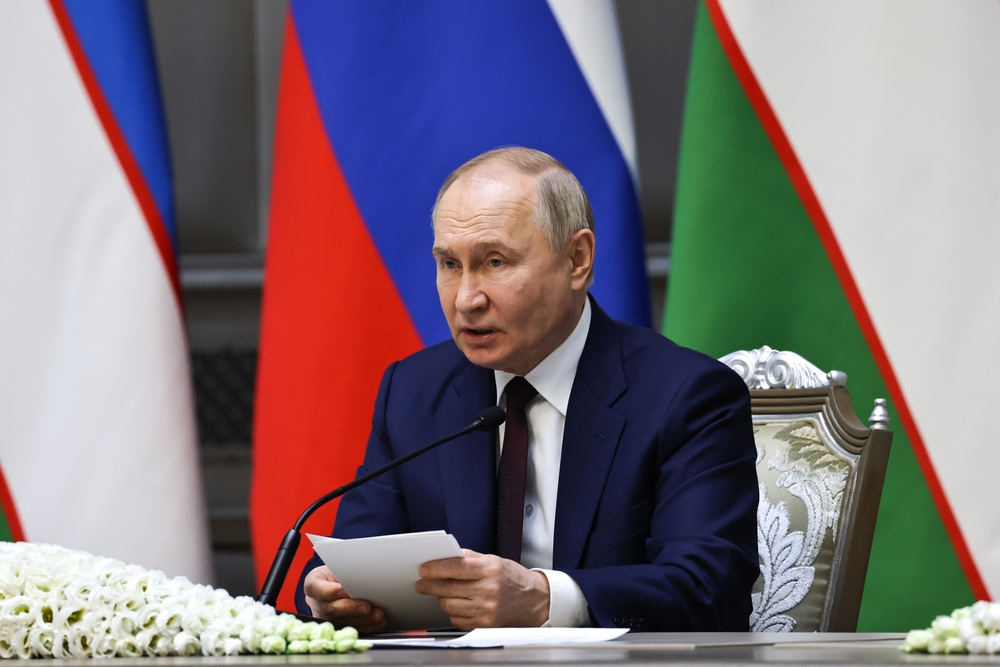Trump Urges Putin to End War in Ukraine or Face Increased Sanctions
Former US President Donald Trump has once again called on Russian President Vladimir Putin to put an end to the ongoing conflict in Ukraine, warning that Russia will face severe economic consequences, including high tariffs and sanctions, if peace talks are not pursued. The remarks, made on Trump’s social media platform, Truth Social, reflect his continued stance on the war that began with Russia's full-scale invasion of Ukraine in February 2022.
Trump’s call for a swift resolution comes as the war continues to take a devastating toll on both nations. While his promises of negotiating a peace deal "in a single day" remain improbable, Trump’s ultimatum to Putin to settle the war or face dire economic penalties has captured the world’s attention. With international actors closely monitoring any shift in US policy towards Ukraine, the implications of Trump’s statements are significant.
Trump’s Ultimatum to Russia
In his Truth Social post, Trump stated that he would impose "high levels of taxes, tariffs, and sanctions" on Russian exports to the United States and its allies if Moscow fails to settle the conflict. He framed this as a "favour" to Russia, claiming that ending the war would benefit both the Russian economy and President Putin, who, according to Trump, is "destroying Russia" with his actions. Trump wrote, “Let’s get this war, which never would have started if I were President, over with! We can do it the easy way, or the hard way - and the easy way is always better. It's time to 'MAKE A DEAL’."
While specifics on the proposed sanctions remain unclear, Trump's threat to intensify economic penalties highlights the growing pressure on Russia. Since the onset of the war, Russia has faced an array of international sanctions targeting its financial system, energy exports, and military capabilities. The impact has been profound, with Russian exports to the US, particularly in sectors like fertilisers and platinum, plummeting. Trump’s further sanctions would likely escalate the economic fallout for Russia, but it remains to be seen whether they would effectively pressure Putin into negotiation.
Ukrainian Response and International Context
In Ukraine, Trump’s latest statements have elicited mixed reactions. While some in Kyiv appreciate the pressure Trump is placing on Russia, many Ukrainians are sceptical of his approach, believing that more decisive actions are needed. The Ukrainian government has been steadfast in its refusal to concede any territory to Russia, which now occupies about 20% of Ukrainian land, including areas like Zaporizhzhia and Crimea. Despite this, Ukrainian President Volodymyr Zelensky has acknowledged that some currently occupied land might need to be temporarily ceded for peace to be achieved.
Zelensky’s concerns were underscored at the World Economic Forum in January 2025, where he called for at least 200,000 peacekeepers to be deployed to ensure a ceasefire agreement’s enforcement. He stressed that such a peacekeeping force must include US troops to act as a credible deterrent to Russian aggression. Without US involvement, Zelensky argues, no nation would risk deploying peacekeepers in the face of potential Russian retaliation.
As the war continues to cause massive loss of life and destruction, the global community remains focused on finding a resolution. Yet, Trump’s rhetoric, while firm, raises questions about how he intends to approach the complex negotiations surrounding Ukraine’s sovereignty, territorial integrity, and future security.
President Donald Trump Misses His Deadline to End the War in Ukraine
One of the key aspects of Trump’s foreign policy during his 2024 presidential campaign was his promise to end the war in Ukraine swiftly. He frequently claimed that, if elected, he would negotiate a peace deal within 24 hours. This bold declaration, which appeared unrealistic from the outset, set an ambitious expectation for Trump’s approach to the conflict. However, as his administration reaches its early stages, it has become clear that such a rapid resolution is far from feasible.
Trump's first significant deadline to address the war came and went without the promised breakthrough. Though no one expected Trump to miraculously end a years-long conflict in a single day, the missed deadline underscores the immense difficulty of resolving the war, which has now entered its third year. Even Trump’s new special envoy to Ukraine, retired US General Keith Kellogg, has acknowledged the complexity of the situation, setting a more realistic 100-day target to find a diplomatic solution.
The delay in addressing the conflict highlights an early challenge for the new administration, with little sign so far of any substantial diplomatic effort to broker peace. While Trump did not explicitly mention Ukraine during his inaugural address, his overall focus on foreign policy seems to be on managing relations with Russia. In his first public remarks after assuming office, Trump did express concern about the state of Russia’s economy, saying that Putin is "destroying Russia" and warning that Russia's vast territory and population were no guarantees of success in the war.
For now, it appears Trump’s first major action will be to initiate a conversation with Putin. The two leaders are expected to discuss a potential in-person meeting in the coming months, with Switzerland and Serbia among the countries offering to host. The prospect of a direct dialogue between Trump and Putin marks a clear break from the approach taken by former President Joe Biden, who refrained from engaging in direct talks with Putin, fearing that it would not lead to any meaningful resolution.
The Challenges of Trump’s Approach
Trump’s direct engagement with Putin contrasts sharply with Biden’s strategy of providing substantial military aid to Ukraine while isolating Russia diplomatically. Trump has expressed confidence that his personal rapport with Putin could facilitate a deal, yet it remains uncertain whether such engagement will yield any meaningful outcomes. Trump’s position on providing arms and intelligence to Ukraine is also unclear. He has consistently opposed Ukraine’s NATO membership, but it remains to be seen what security guarantees he would offer Kyiv in exchange for a peace deal.
Moreover, Trump has not specified who would bear the cost of Ukraine's reconstruction, despite the widespread destruction caused by the war. Given his previous comments regarding foreign aid, it is unlikely that Trump would commit US resources to Ukraine’s rebuilding without significant contributions from European allies.
Related: Trump Criticises Putin for ‘Destroying Russia’ Over Ukraine War
Related: Donald Trump's First Day in Office: Executive Actions and Policy Shifts
Related: A Comprehensive Overview of Donald Trump’s Foreign Policy: Key Actions and Controversies
Zelensky’s Concerns and the Need for European Leadership
While Trump’s rhetoric has captured attention, Ukrainian President Zelensky has voiced concerns over the focus of the new US administration on the conflict. Speaking on Tuesday, Zelensky suggested that European countries must play a larger role in resolving the war. He stated that while the United States is an "indispensable" ally to Europe, the relationship may not always be fully reciprocal when it comes to addressing regional security concerns.
Zelensky's comments highlight the need for a broader, multinational approach to the crisis, with European nations stepping up to provide both military and financial support for Ukraine. At the same time, Zelensky remains cautious about Trump’s long-term commitment to Ukraine's security, with the US president’s stance on NATO and military aid still uncertain.
Can Trump Bring Peace to Ukraine?
As the war in Ukraine continues to evolve, the prospects for peace remain unclear. While Trump’s tough talk and promises of swift resolution might resonate with some, the reality of negotiating peace in a conflict of this scale is far more complicated. The ongoing territorial disputes, the role of NATO, and the geopolitical ramifications of any settlement make a quick resolution highly unlikely.
Trump’s challenge will be balancing his desire for a swift resolution with the complex diplomatic realities on the ground. His stance on Russia and Ukraine may shift as he faces the practical challenges of foreign policy, and his approach will likely evolve over time. As the conflict drags on, the world will be watching closely to see if Trump’s methods can indeed bring an end to the war—or if his promises of peace will remain unfulfilled.
For now, Ukraine’s future hangs in the balance, and the international community remains committed to finding a peaceful, lasting solution to the conflict.
Conclusion
The possibility of Trump ending the war between Ukraine and Russia could be a strategic move that resonates with many Americans weary of prolonged foreign conflicts. His "America First" policy often emphasised withdrawing from international entanglements, and ending the war could align with that agenda, appealing to those frustrated by the costs of the conflict. For many, it's long overdue for the U.S. to reassess its involvement and prioritise domestic issues. If Trump can broker peace, it would bolster his position as a decisive leader, showing his ability to negotiate and bring meaningful change in international relations.











